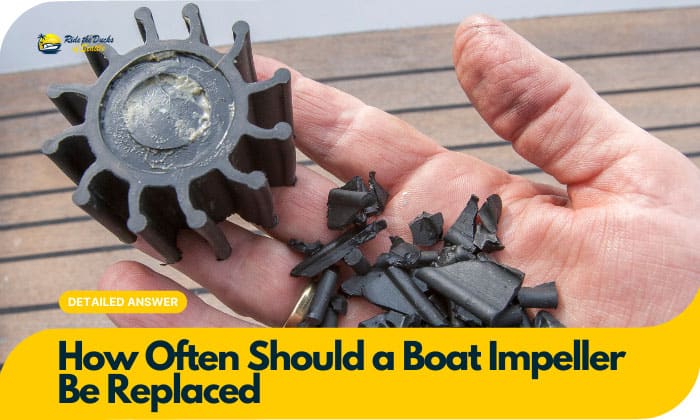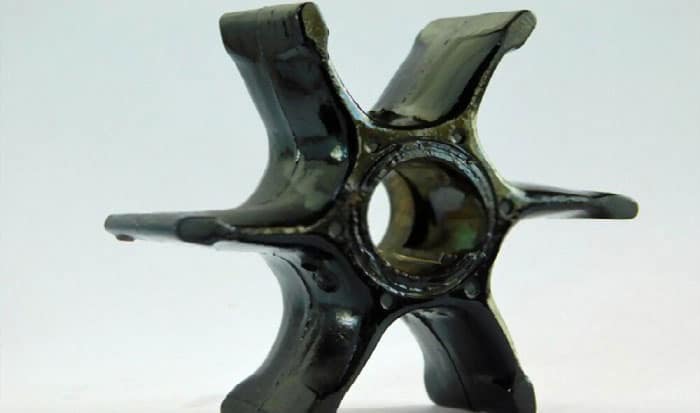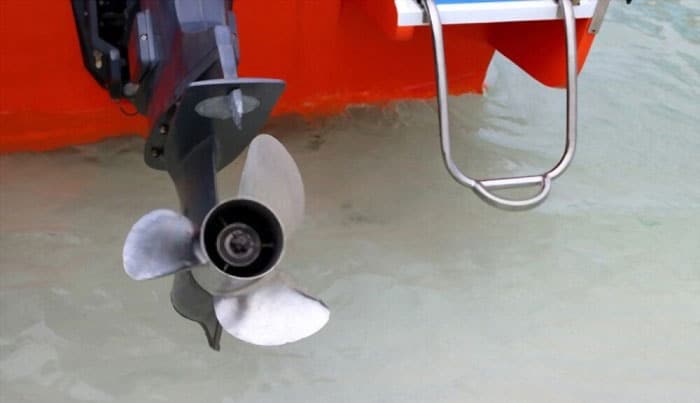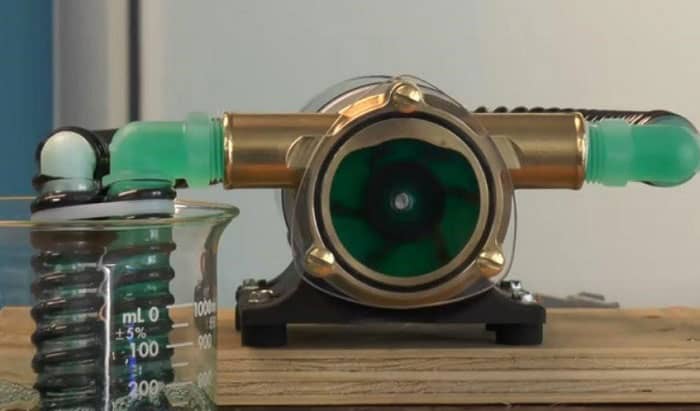Impellers are essential components of a boat’s engine cooling system, so it is natural to ask how often should a boat impeller be replaced. Boating experts recommend replacing the impeller every 100 to 300 operating hours or every three years.
However, advanced wear and tear and faulty maintenance can push impellers into early retirement. Please keep reading to know more about boat impeller replacement.
Table of Contents
How Often to Change Impeller
Boating experts recommend impeller replacement every three years or 100-300 operating hours, whichever comes first. This recommendation ensures safer and more pleasant boating adventures by guaranteeing healthier and more efficient engine performance.
This is because the impellers keep your engine from overheating by drawing water from the boat’s outside environment and channeling it to the cooling system. If the impeller malfunction on your boat trip, the ensuing engine damage will call for costly repair or replacement—up to $10,000 if you’re unfortunate enough.
Hence, routine boat maintenance should include impeller checks. You might want to learn how to spot a failing impeller to know when a replacement is necessary.
And if you worry about the cost, the impeller replacement cost is pretty affordable. In most cases, the price is less than $300.
Signs of a Bad Impeller
Boaters must learn the signs of a bad impeller in outboard or inboard engines. The following are the most common manifestations of an impeller issue.
1. Engine overheating
Engine overheating is one of the boat water pump impeller failure symptoms no boater should ignore. It can damage the engine block, cylinders, or gasket head, leading to a costly rebuild if not replacement.
You will want to check your manual for the engine’s optimal operating temperature and compare it with the temperature gauge readings. For example, if the manual says your engine’s maximum temperature is 160℉, yet the gauge reads 180℉, there is a good chance your impeller is busted.
However, make sure the boat’s water strainer and intake aren’t clogged first, as these can also be the reason behind engine overheating.
2. Reduced water from the tell-tale
One of the most common reasons for reduced water coming out of the engine’s tell-tale hole is a busted impeller. Depending on the problem’s severity, there might be no water coming out at all.
Run your engine and have someone take a picture of the water stream going out of it. If it is barely noticeable or there is still no water coming out even after cleaning the engine’s internal parts, there is a good chance you have a busted impeller.
3. Poor engine performance
Engine overheating and reduced water pressure can impact the engine’s performance. For example, if your boat does not throttle up, you might need to inspect the impeller boat motor closer.
4. Smoking engine
An engine that gets too hot can burn excess oil on the surfaces. Oil and similar substances are combustible, creating smoke and increasing the risk of onboard fires.
5. Unusually “hollow” engine sound
This bad impeller sound indicates no water flowing or circulating through the engine. It is worth noting that water pressure muffles engine sounds. Hence, unusually hollow and loud sounds from the engine can mean a bad impeller.
6. Signs of impeller deterioration or damage
Some greenhorn boaters wonder how to tell if impeller needs replacing. And we always advise them to look for signs of damage or deterioration, such as melted rubber, bends, cracks, and other deformities.
You should also make sure the impeller’s vanes are still firm, meaning they should not bend or lean to one side.
Reasons for Boat Impeller Failure
You already know how to tell if your outboard water pump is bad or the impeller is failing. However, we are confident you also want to know why impellers fail.
- Cavitation – Tiny air bubbles in the water circulating in the boat engine can cause impeller disintegration because of pressure level fluctuations.
- Corrosion and chemical reaction – Extremely-low water pH levels increase corrosion rate. Washing or cleaning your boat with acidic substances can make it more susceptible to impeller deterioration.
Similarly, undetected chemicals in the water, such as sodium hypochlorite and chlorine, can also be the culprit.
- Erosion – Piloting your boat in shallow waters with sandy or muddy bottoms can lead to the engine sucking up abrasive particles. These tiny objects can scratch the impeller, causing erosion over time.
- Running the engine off the water – Water remains the most important lubricant for impellers. Hence, dry-running an engine, even briefly, can expose the impeller to unnecessary wear. In addition, make sure to lubricate your impeller every time you inspect your boat.
- Prolonged dry storage – Just as dry-running the engine can lead to impeller issues on MerCruiser engines (or any other boat motor), so does dry storage. The rubber impeller can dry out, making it brittle and start to crack.
Selecting the Right Boat Impeller
Even a new impeller not pumping water requires replacement. The question is, how do you choose the right boat impeller? Here are some tips.
- Keep your old impeller as a reference for a replacement unit.
- You might want to check your owner’s manual for impeller technical information, including model and part number. You can use the data to search for the most appropriate impeller for your boat.
- Consider posting in online community forums and ask members for recommendations on what impeller is correct for your engine.
- Impellers feature rubber or other flexible material. Hence, pay attention to its integrity before buying. It should not have any cracks or signs of brittleness.
- Check the impeller’s wear resistance by comparing product technical information with real-world user experiences. You can also read unbiased product reviews.
- Consider the impeller’s outlet vane angle. Know that high-outlet angles rotate at higher speeds but are less efficient and more prone to wear. Meanwhile, low-outlet angles are highly efficient.
- The impeller’s vane inlet angle also matters because the correct angle reduces cavitation risk and wear severity while improving pump efficiency.
How to Replace Impeller
How do you know if impeller is working? We described several signs and their reasons. However, a more important question is how to replace a failing impeller. Here’s a short guide:
- Step 1: Remove the engine’s lower unit by loosening the bolts or screws. Ask an assistant to help hold and slide the lower unit from the outboard engine. Place the lower unit in a secure area, ensuring it stays upright.
- Step 2: Loosen the hardware securing the water pump housing. Carefully insert a flat-tipped screwdriver or any straight edge tool under the water pump housing’s bottom edges to pop them out. Lift the housing.
- Step 3: Inspect the water pump’s components, including the impeller, bottom gasket, key, cup, and baseplate. Check for bends, tears, cracks, melting, and other signs of deterioration or loss of integrity.
- Step 4: Replace the damaged or broken impeller and other water pump components. You might want to read the impeller manufacturer’s direction for installation to ensure correct placement.
- Step 5: Replace the water pump housing, ensuring it adheres to the lower unit’s surface. Secure it with bolts or screws. Gently raise the lower unit and position it under the outboard engine before sliding it back up. Apply grease to the bolts before securing the lower unit.
- Step 6: Test the water pump by hooking it to a freshwater supply line. Start the engine and check if water is circulating through the motor.
FAQs
Where is the impeller on a boat?
The impeller on a boat is in the vessel’s water pump. It is similar to a water pump in automotive engines, drawing water from the boat’s external environment and delivering it to the cooling system to prevent engine overheating.
What happens if my boat impeller fails?
Irreversible engine damage can occur if the impeller fails. It is worth remembering that impellers “circulate” cool water to engine components to prevent them from overheating.
Excessive engine temperatures can damage the cylinders and head gasket. It may even blow the engine block, leading to costly engine replacement.
When should I replace my boat impeller?
You should check your boat engine manufacturer’s recommendations on when to replace the impeller. Most brands observe a three or 300 rule (three years or 300 operating hours, whichever comes first).
Ideally, you will want to replace or change impeller devices when winterizing your boat, especially if you have an inboard/outboard (stern) or outboard drive. These boat drive systems require draining the lower unit oil.
Scheduling the impeller replacement at this time makes perfect sense to save on the oil. You will only need to drain it once to access the impeller.
How many impellers should my boat have?
Boats can have up to seven impellers, depending on size. You can check your boat’s owner’s manual and look at the technical specifications to determine the number of impellers.
Conclusion
“How often should a boat impeller be replaced?” is a valid and rightful concern for greenhorn boat owners. After all, impellers are crucial to keeping a boat engine from overheating.
The current rule is to replace an impeller every 100 to 300 operating hours. If you go boating infrequently and briefly, 300 hours might last ten years. In such cases, the impeller replacement frequency should be every three years.
However, impeller brands have specific replacement frequencies. Boaters should check their owner’s manual for such recommendations while performing periodic annual checks to ensure maximum impeller integrity and optimal engine performance.
Read more: Propeller vs impeller: What is the difference?

Ten years of enjoying countless trips on boats never made me love them any less! So I am here to put all those experiences into good use for other boaters who want to have a safe and fun trip with their friends and families.





